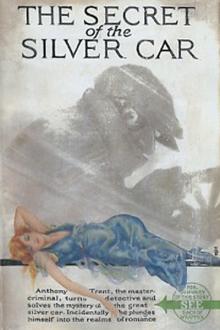The Secret of the Silver Car, Wyndham Martyn [best novels to read to improve english txt] 📗

- Author: Wyndham Martyn
- Performer: -
Book online «The Secret of the Silver Car, Wyndham Martyn [best novels to read to improve english txt] 📗». Author Wyndham Martyn
“Certainly sir,” Castoon returned stiffly. “I can hardly see the necessity of reminding me of it.”
When the meeting had broken up Anthony Trent was amazed to see Colonel Langley’s outstretched hand.
“I must apologize,” he said frankly, “I did not know that you were working for my chief or that he regarded you so highly. You shoot I suppose?”
“Crazy over it,” Anthony Trent admitted.
“I wish you would be one of the guns next September the first. My place is at Dereham Old Hall in Norfolk. You have never been to that part of the world I imagine?”
Anthony Trent looked at the tall colonel and understood.
“Never,” he said, “but I shall be delighted to
come.”
Maitland remained after the others left. It was necessary that the premier should endorse his conduct with his own chief. British destroyers are not designed as passenger boats.
“Of course you are going to make your headquarters with us?” Lord Rosecarrel said and pointed to his waiting limousine.
“I think not,” Trent returned. He had not forgotten that when he planned to go to Castle Radna he gave his word that he would seek no reward. To go back to Grosvenor Place would seem as though he had forgotten this.
“But I insist,” the earl said.
“You are asking me to put myself in torment,” he returned.
“Fiddlesticks!” the other cried, “How youth exaggerates.”
Anthony Trent felt it was weak of him but he climbed into the car. The thought of seeing Daphne again was intoxicating. He was grateful that there was silence during the five minute ride.
The butler informed his master that Lady Daphne had come in and was now in bed.
“Did she know I was here?” Trent asked him.
“No, sir,” said the man, “I did not see her ladyship.”
The earl pushed a silver cigarette box over the table of his library.
“I don’t want to talk of politics,” he said “until tomorrow.”
“Nor I,” Trent answered and passed the draft of the treaty to the other.
The earl held it in his fingers until the flame reached them. The paper was now ashes and a memory.
“Anthony Trent,” said the earl, “No matter what you have done or what things have conspired to make your life unfortunate, you are a chivalrous gentleman. Let me smoke in silence for a little. My heart is too full for speech.”
“Now,” he said later, “Let me tell you about Arthur. He is splendid. He is my own lad again. The years that the locusts have eaten are still blotted from him. He has confidence in himself. He is marrying one of the dearest of girls next month. You are back in time. It is no secret that you are to be his best man.”
“That’s good news indeed,” Trent said heartily.
“It has made me very happy,” the earl said slowly, “and incidentally made me examine my conduct rather more severely than I had ever thought of doing.”
“I’m afraid I don’t see what you mean sir,” the younger man said during the long pause.
“I will tell you. Here was the girl. Young, beautiful, of a great family. She had everything to offer and my son loved her. Here was the problem. Had I the right to let her marry him when there lay behind him those misspent years? I wondered whether I was not bound to tell her father of what he had done. It was true he was not responsible but nevertheless he had done them. In the end I persuaded myself that where love existed as it did between my son and the woman he is to marry, pasts counted for little.”
Anthony Trent looked at him for a long time in silence.
“Had you any especial reason for telling me this?” he asked.
Lord Rosecarrel smiled.
“I am tired and must sleep,” he said, “and my wits may be wool-gathering; but you know me well enough, I hope, to be sure that I have my reasons for making confidences.”
“I am afraid to say what I think,” stammered Anthony Trent.
“Then put it off until tomorrow,” the earl laughed, “Go and sleep, my dear boy, even though it may be in torment. We breakfast rather later here than in the country. I don’t suppose Daphne will be down until ten. We keep such late hours.”
ANTHONY THE TRIUMPHANTThe butler tapped upon Trent’s door before nine next morning.
“I’ve just taken a telephone message for you, Mr. Anthony, very important if I may judge.”
“Come in and tell me about it,” the American said. He could not imagine who knew his whereabouts. It must be Maitland, he supposed, who had promised to see him before he joined his destroyer again if it were possible.
“It’s from the American Embassy,” the butler informed him.
“What?” Trent demanded. “Are you sure?”
The American Embassy! What had he to do with that? Once behind the doors he was on American soil and subject to her jurisdiction.
“It was a message saying that the ambassador must see you at once. I took the liberty of saying I thought you could get there by half past nine. A motor will be waiting when you have dressed.”
Anthony Trent sat on the edge of his bed and saw all his high hopes dashed to earth. Someone must have told the ambassador of this young fellow countryman of his who was on intimate terms with a cabinet minister. And the ambassador with the aid of his intelligence department must have run him to earth.
For a moment he wondered whether it would not be wiser to make a run for it. Maitland now assured of his bona fides would not hesitate to take him with him and land him at some lonely spot on the Italian coast by night. He had money and his wits. It would be beginning life over again but it would be better than disgrace here in London.
Then his fighting side asserted itself. He would not be frightened into flight before he was convinced flight was necessary.
There was another visitor in the American ambassador’s waiting room, a man of middle age who smoked an excellent cigar. He turned as Trent entered.
“Morning,” said Trent morosely. He was annoyed to find that he had to speak. It was the publisher of a chain of magazines for one of which Trent used to write when engaged in the manufacture of light fiction. He had often smoked one of the millionaire’s celebrated cigars.
“Good morning,” said the publisher graciously. “It’s a long time since I saw you.”
“The ambassador keeps extraordinary hours,” Trent commented.
“He’s a business man,” the other explained, “Not bred to the old time diplomacy, just a plain, business man.
“What have you done that he sent for you?” Trent asked.
“You don’t seem to understand,” the publisher said mildly.
“I only understand,” Trent said, still irritably, “that I’m being kept waiting. He was to see me at nine thirty and it’s now twenty minutes to breakfast.”
“He was on the minute,” the other laughed, “Where have you been not to know I’m the ambassador?”
“You!” said Trent in amazement.
“And I’m making a damned good one,” the diplomat said, “even if I do get up hours before the rest of ‘em.”
“What am I here for?” Trent demanded.
“Congratulations mainly,” said the ambassador. “I was waked out of sleep at after midnight by the prime minister. He wanted to know if I had heard of an American called Anthony Trent. I said ‘Sure. He used to write for me. Anthony Trent is all right.’ The way these Londoners keep up half the night is something shocking.”
“I still don’t see why you’ve sent for me, Mr. Hill.”
“I’ll explain,” said the ambassador. His manner was serious, so serious indeed that Anthony Trent was infinitely perturbed. “You may not know it but you’ve rendered your country a considerable service. Over here in the Birthday or New Year honours list you’ll find decorations awarded men the public knows nothing about. Trent, sometimes they are given for work like you have done. We don’t give orders or decorations or grants of money. If we did you’d have one coming to you. What you’ve done won’t even come before Congress. You’ll be a mute inglorious Milton, but—if the day comes when you need help, if you should ever be in a tight place, remember you’ve got something to trade with. I’m not going to mention this again but you bear it in mind.”
“I certainly will,” Trent said gratefully. Then he spoke a little hesitatingly. “Be frank with me, Mr. Hill. I ask this as a personal favor. Had you anything at the back of your mind when you spoke about my being in a tight place or needing help?”
“No,” the ambassador said after a mental reaction which could be measured in seconds. “But you’ve made enemies here. Some of ‘em have sent in asking what you do for your livelihood. Of course I remembered that Australian uncle. He certainly must have cut up rich.”
“He did,” Anthony Trent said sombrely. He had invented an Australian uncle years before to account for possession of the large sums of money his professional work netted him. Oddly enough the memory gave him little pleasure now.
“I was able to assure the inquisitive,” the diplomat declared, “that I had known you for years.”
Enemies! Castoon perhaps, who hated him on sight, and possibly the Colonel Langley who was now his friend. What others unknown to him might there not be! And there was Lady Polruan sister of Willoughby Maitland. She probably would be influenced by her favorite brother and receive him on a friendly footing if they met again. These people he knew. But it was the unknowns who bothered him.
“Was Rudolph Castoon one of them?” he inquired.
“The Chancellor of the Exchequer?” Hill laughed. “My boy you have certainly got right into the tophole set here. The inquisitive ones were your own countryfolk who were jealous that a man not even in the Social Register got in on intimate terms with the great families. Maybe they wanted to get your formula. Nothing serious. I’ve got a busy morning. Lunch with me at one tomorrow?”
“Gladly,” Anthony Trent returned, his manner brighter. Never had he shaken hands so heartily with his old publisher.
“It’s done me good to see you,” he exclaimed.
The friendly butler informed Trent in confidence that Lady Daphne was not yet down. His lordship was already riding in the Row.
“Her ladyship has not been informed of your arrival,” said the butler. “She is expected down in a few minutes. I have ordered kidneys and bacon en brochette for you, sir.”
“This feels like being really at home,” the American said. “I have wanted that for breakfast every morning I’ve been away and never once had the luck to get it.”
Below stairs the butler informed the housekeeper, who later retailed it to maids, that Mr. Anthony seemed very nervous. A footman openly rejoiced when he overheard the butler’s conversation with the housekeeper that his duties would enable him to witness the meeting of his mistress and the American.
“There will be nobody in the breakfast room when her ladyship enters but Mr. Anthony,” his superior said firmly. “Haven’t you got any romance in you, Simpkins?”
“Yes,” answered the footman simply, “that’s why I want to see them.”
Anthony Trent was sitting in a big winged chair by the





Comments (0)